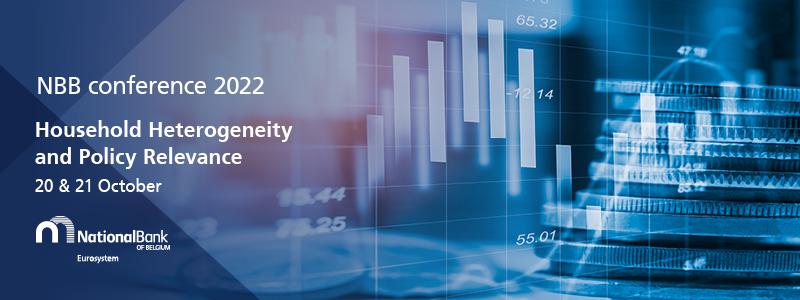Internationale conferentie 2022 over 'Household Heterogeneity and Policy Relevance'

De globale financiële crisis, de COVID-19-pandemie en de huidige energiecrisis hebben huishoudens op verschillende manieren getroffen naargelang van hun sociaal-economische status. Huishoudens reageren ook anders op economische beleidsmaatregelen naargelang van hun specifieke beperkingen en mogelijkheden. Over het algemeen is de maatschappij gevoeliger geworden voor deze verdelingsaspecten. In dit verband slagen economische analyses er steeds beter in trends en drijvende krachten achter ongelijkheid te documenteren en het belang van heterogeniteit voor het transmissiemechanisme van beleidsmaatregelen in te schatten. Economische modellen werden verbeterd om rekening te houden met verschillende aspecten van de heterogeniteit van huishoudens. Deze empirische en theoretische inzichten vormen de basis voor een optimaal beleidsontwerp dat deze verdelingsaspecten in aanmerking neemt.
Tal van nieuwe onderzoeksresultaten over deze thema’s zullen tijdens onze conferentie worden toegelicht. Twaalf teams van Belgische en internationale onderzoekers zullen hun bevindingen uiteenzetten, telkens gevolgd door een bespreking met internationale experts. Daarnaast zullen Giovanni L. Violante (Princeton University) en Amir Sufi (University of Chicago - Booth School of Business) een keynotespeech geven.
Introduction by Pierre Wunsch, Governor of the National Bank of Belgium
Session 1: Distributional effects of shocks and policy
Keynote presentation
Some like it hot: a distributional analysis of inclusive monetary policy
Giovanni L. Violante (Princeton University)
The consumption response to labour income changes
Kris Boudt, Koen Schoors, Milan van den Heuvel, Johannes Weytjens (Universiteit Gent)
- WP 415 - Presentation - Video
- Discussant: Michael Gelman (Claremont McKenna College) - Presentation - Video
Heterogeneous household responses to energy price shocks
Gert Peersman (Universiteit Gent) and Joris Wauters (National Bank of Belgium
- WP 416 - Presentation - Video
- Discussant: Maarten Dossche (European Central Bank) - Presentation
Session 2: Various aspects of household heterogeneity and implications
Chair: Raf Wouters (Economics and Research Department – NBB)
Invited presentation
Optimal monetary policy during a cost-of-living crisis
Vincent Sterk (University College London)
- Presentation - Video
- Discussant: Kathrin Schlafmann (Copenhagen Business School) - Presentation - Video
Income inequality in general equilibrium
Bastien Bernon (Université libre de Bruxelles), Joep Konings (KU Leuven, GSB Nazarbayev, CEPR) and Glenn Magerman (Université libre de Bruxelles, CEPR)
Discussant: Julien Sauvagnat (Bocconi University)
- WP 417 - Presentation - Video
- Discussant: Julien Sauvagnat (Bocconi University) - Presentation - Video
The long and short of financing government spending
Jochen Mankart (Deutsche Bundesbank), Rigas Oikonomou (UCLouvain) and Romanos Priftis (European Central Bank)
Discussant: Fernando Broner (CREI, UPF, Barcelona School of Economics)
- WP 418 - Presentation - Video
- Discussant: Fernando Broner (CREI, UPF, Barcelona School of Economics) - Presentation - Video
Labour supply of households facing a risk of job loss
Wouter Gelade, Maud Nautet and Céline Piton (National Bank of Belgium)
- WP 419 - Presentation - Video
- Discussant: Frederic Vermeulen (KU Leuven) - Presentation - Video
Session 3: Household finance
Chair: Olivier De Jonghe (Economics and Research Department – NBB)
Invited presentation
The long-run impact of a marginal mental health diagnosis on income, wealth, and health. Evidence from randomly assigned doctors.
Marieke Bos (Swedish House of Finance at the Stockholm School of Economics, Vrije Universiteit Amsterdam)
- Presentation - Video
- Discussant: Maarten Lindeboom (Vrije Universiteit Amsterdam) - Presentation - Video
Over-indebtedness and poverty : patterns across household types and policy effects
Sarah Kuypers and Gerlinde Verbist (Centrum voor Sociaal Beleid Herman Deleeck – Universiteit Antwerpen)
- WP 420 - Presentation - Video
- Discussant: Olga Cantó Sánchez (Universidad de Alcalá, EQUALITAS) - Presentation - Video
Evaluating heterogeneous effects of housing-sector-specific macroprudential policy tools on Belgian house price growth
Lara Coulier and Selien De Schryder (Universiteit Gent)
- WP 421 - Presentation - Video
- Discussant: Aino Silvo (Bank of Finland) - Presentation - Video
Bank competition and bargaining over refinancing
Marina Emiris (National Bank of Belgium), François Koulisher (Université du Luxembourg) and Christophe Spaenjers (University of Colorado Boulder)
- WP 422 - Presentation - Video
- Discussant: Lu Liu (The Wharton School, The University of Pennsylvania) - Presentation - Video
Session 4: Inequality: drivers and implications
Housing inequality and how fiscal policy shapes it: evidence from Belgian real estate
Gerard Domènech-Arumi (Université libre de Bruxelles), Paula Gobbi and Glenn Magerman (Université libre de Bruxelles, CEPR)
- WP 423 - Presentation - Video
- Discussant: Guillaume Chapelle (THEMA, CY Cergy Paris Université) - Presentation - Video
Income inequality and the German export surplus
Ansgar Rannenberg (National Bank of Belgium), Thomas Theobald (Institut für Makroökonomie und Konjunkturforschung Düsseldorf)
- WP 424 - Presentation - Video
- Discussant: Alessandro Ferrari (European Central Bank) - Presentation - Video
Keynote presentation
Role of inequality in finance and macroeconomics
Amir Sufi (University of Chicago)
